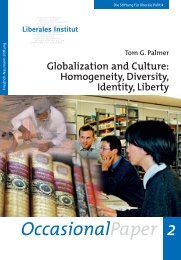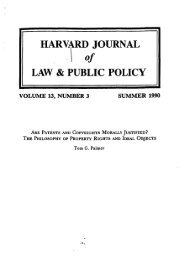G. A. Cohen on Self-Ownership, Property, and ... - Tom G. Palmer
G. A. Cohen on Self-Ownership, Property, and ... - Tom G. Palmer
G. A. Cohen on Self-Ownership, Property, and ... - Tom G. Palmer
You also want an ePaper? Increase the reach of your titles
YUMPU automatically turns print PDFs into web optimized ePapers that Google loves.
232 Critical Review Vol. 12, No. 3would not-or would be irrati<strong>on</strong>al to-agree to divisi<strong>on</strong> is unsupported.Before proceeding to the next serious error in <str<strong>on</strong>g>Cohen</str<strong>on</strong>g>’s argument, ashort digressi<strong>on</strong> about <str<strong>on</strong>g>Cohen</str<strong>on</strong>g>’s misunderst<strong>and</strong>ing of Nozick is inorder, although this correcti<strong>on</strong> is not necessary to show the errors in<str<strong>on</strong>g>Cohen</str<strong>on</strong>g>’s reas<strong>on</strong>ing. <str<strong>on</strong>g>Cohen</str<strong>on</strong>g> (1995, 84) claims that,”Nozick must supposethat the world’s resources are, morally speaking, nothing likejointly owned, but very much up for grabs, yet, far tiom establishingthat premiss, he does not even bother to state it, or show any awarenessthat he needs it:’ This is untrue; Nozick (1974, 178) clearly statesthat he believes that any ownership claim must be justified, whethercollective or individual or mixed: “It is not <strong>on</strong>ly pers<strong>on</strong>s favoring pivateproperty who need a theory of how property rights legitimatelyoriginate. Those believing in collective property, for example thosebelieving that a group of pers<strong>on</strong>s living in an area jointly own the territory,or its mineral resources, also must provide a theory of how suchproperty rights arise; they must show why the pers<strong>on</strong>s living therehave rights to determine what is d<strong>on</strong>e with the l<strong>and</strong> <strong>and</strong> resourcesthere that pers<strong>on</strong>s living elsewhere d<strong>on</strong>’t have (with regard to the samel<strong>and</strong> <strong>and</strong> resources).” Rather than Nozick being guilty of “not evenbothering to state , . . or show any awareness that he needs” such atheory, it is <str<strong>on</strong>g>Cohen</str<strong>on</strong>g> who fails to provide a theory of how or why jointownership might be, or might have been, justified, bey<strong>on</strong>d assertingthat it is “intuitively relevant!’Again, however, this clarificati<strong>on</strong> is not essential to showing theerror in <str<strong>on</strong>g>Cohen</str<strong>on</strong>g>’s argument. Even granting <str<strong>on</strong>g>Cohen</str<strong>on</strong>g>’s assumpti<strong>on</strong> of initialjoint ownership, he has failed to show that it would be irrati<strong>on</strong>alto agree to divide ownership of assets.Is Unequal Divisi<strong>on</strong> of/ointly Produced Output Ivvati<strong>on</strong>al?<str<strong>on</strong>g>Cohen</str<strong>on</strong>g>’s sec<strong>on</strong>d <strong>and</strong> more complex argument is an attempt to showthat, assuming inescapably joint ownership (i.e., insisting that, c<strong>on</strong>traryto historical experience <strong>and</strong> the c<strong>on</strong>siderati<strong>on</strong>s listed above, itwould be irrati<strong>on</strong>al to agree to divisi<strong>on</strong>),’unequal c<strong>on</strong>tributi<strong>on</strong>s to ajointly produced product (i.e., a product to which all factor inputssave <strong>on</strong>e-labor-are jointly owned) will result in precisely equal distributi<strong>on</strong>of the joint product (“final equality of c<strong>on</strong>diti<strong>on</strong>”). (Thisc<strong>on</strong>clusi<strong>on</strong> further assumes equal preference for leisure over labor;











